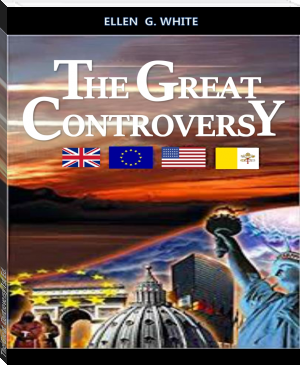The Great Controversy 1st Ed. - Ellen G. White (list of e readers .TXT) 📗

- Author: Ellen G. White
Book online «The Great Controversy 1st Ed. - Ellen G. White (list of e readers .TXT) 📗». Author Ellen G. White
This has continued until the glorious truth of the resurrection has been almost wholly obscured and lost sight of by the Christian world. Thus a leading religious writer, commenting on the words of Paul in I Thessalonians 4:13-18, says: "For all practical purposes of comfort the doctrine of the blessed immortality of the righteous takes the place for us of any doubtful doctrine of the Lord's second coming. At our death the Lord comes for us. That is what we are to wait and watch for. The dead are already passed into glory. They do not wait for the trump for their judgment and blessedness."
But when about to leave His disciples, Jesus did not tell them that they would soon come to Him. "I go to prepare a place for you," He said. "And if I go and prepare a place for you, I will come again, and receive you unto Myself." John 14:2, 3. And Paul tells us, further, that "the Lord Himself shall descend from heaven with a shout, with the voice of the Archangel, and with the trump of God: and the dead in Christ shall rise first: then we which are alive and remain shall be caught up together with them in the clouds, to meet the Lord in the air: and so shall we ever be with the Lord." And he adds: "Comfort one another with these words." I Thessalonians 4:16-18. How wide the contrast between these words of comfort and those of the Universalist minister previously quoted! The latter consoled the bereaved friends with the assurance that, however sinful the dead might have been, when he breathed out his life here he was to be received among the angels. Paul points his brethren to the future coming of the Lord, when the fetters of the tomb shall be broken, and the "dead in Christ" shall be raised to eternal life.
Before any can enter the mansions of the blessed, their cases must be investigated, and their characters and their deeds must pass in review before God. All are to be judged according to the things written in the books and to be rewarded as their works have been. This judgment does not take place at death. Mark the words of Paul: "He hath appointed a day, in the which He will judge the world in righteousness by that Man whom He hath ordained; whereof He hath given assurance unto all men, in that He hath raised Him from the dead." Acts 17:31. Here the apostle plainly stated that a specified time, then future, had been fixed upon for the judgment of the world.
Jude refers to the same period: "The angels which kept not their first estate, but left their own habitation, He hath reserved in everlasting chains under darkness unto the judgment of the great day." And, again, he quotes the words of Enoch: "Behold, the Lord cometh with ten thousands of His saints, to execute judgment upon all." Jude 6, 14, 15. John declares that he "saw the dead, small and great, stand before God; and the books were opened: . . . and the dead were judged out of those things which were written in the books." Revelation 20:12.
But if the dead are already enjoying the bliss of heaven or writhing in the flames of hell, what need of a future judgment? The teachings of God's word on these important points are neither obscure nor contradictory; they may be understood by common minds. But what candid mind can see either wisdom or justice in the current theory? Will the righteous, after the investigation of their cases at the judgment, receive the commendation, "Well done, thou good and faithful servant: . . . enter thou into the joy of thy Lord," when they have been dwelling in His presence, perhaps for long ages? Are the wicked summoned from the place of torment to receive sentence from the Judge of all the earth: "Depart from Me, ye cursed, into everlasting fire"? Matthew 25:21, 41. Oh, solemn mockery! shameful impeachment of the wisdom and justice of God!
The theory of the immortality of the soul was one of those false doctrines that Rome, borrowing from paganism, incorporated into the religion of Christendom. Martin Luther classed it with the "monstrous fables that form part of the Roman dunghill of decretals."--E. Petavel, The Problem of Immortality, page 255. Commenting on the words of Solomon in Ecclesiastes, that the dead know not anything, the Reformer says: "Another place proving that the dead have no . . . feeling. There is, saith he, no duty, no science, no knowledge, no wisdom there. Solomon judgeth that the dead are asleep, and feel nothing at all. For the dead lie there, accounting neither days nor years, but when they are awaked, they shall seem to have slept scarce one minute."-- Martin Luther, Exposition of Solomon's Booke Called Ecclesiastes, page 152.
Nowhere in the Sacred Scriptures is found the statement that the righteous go to their reward or the wicked to their punishment at death. The patriarchs and prophets have left no such assurance. Christ and His apostles have given no hint of it. The Bible clearly teaches that the dead do not go immediately to heaven. They are represented as sleeping until the resurrection. I Thessalonians 4:14; Job 14:10-12. In the very day when the silver cord is loosed and the golden bowl broken (Ecclesiastes 12:6), man's thoughts perish. They that go down to the grave are in silence. They know no more of anything that is done under the sun. Job 14:21. Blessed rest for the weary righteous!
Time, be it long or short, is but a moment to them. They sleep; they are awakened by the trump of God to a glorious immortality. "For the trumpet shall sound, and the dead shall be raised incorruptible. . . . So when this corruptible shall have put on incorruption, and this mortal shall have put on immortality, then shall be brought to pass the saying that is written, Death is swallowed up in victory." I Corinthians 15:52-54. As they are called forth from their deep slumber they begin to think just where they ceased. The last sensation was the pang of death; the last thought, that they were falling beneath the power of the grave. When they arise from the tomb, their first glad thought will be echoed in the triumphal shout: "O death, where is thy sting? O grave, where is thy victory?" Verse 55.
The ministration of holy angels, as presented in the Scriptures, is a truth most comforting and precious to every follower of Christ. But the Bible teaching upon this point has been obscured and perverted by the errors of popular theology. The doctrine of natural immortality, first borrowed from the pagan philosophy, and in the darkness of the great apostasy incorporated into the Christian faith, has supplanted the truth, so plainly taught in Scripture, that "the dead know not anything." Multitudes have come to believe that it is spirits of the dead who are the "ministering spirits, sent forth to minister for them who shall be heirs of salvation." And this notwithstanding the testimony of Scripture to the existence of heavenly angels, and their connection with the history of man, before the death of a human being.
The doctrine of man's consciousness in death, especially the belief that spirits of the dead return to minister to the living, has prepared the way for modern spiritualism. If the dead are admitted to the presence of God and holy angels, and privileged with knowledge far exceeding what they before possessed, why should they not return to the earth to enlighten and instruct the living? If, as taught by popular theologians, spirits of the dead are hovering about their friends on earth, why should they not be permitted to communicate with them, to warn them against evil, or to comfort them in sorrow? How can those who believe in man's consciousness in death reject what comes to them as divine light communicated by glorified spirits? Here is a channel regarded as sacred, through which Satan works for the accomplishment of his purposes. The fallen angels who do his bidding appear as messengers from the spirit world. While professing to bring the living into communication with the dead, the prince of evil exercises his bewitching influence upon their minds.
He has power to bring before men the appearance of their departed friends. The counterfeit is perfect; the familiar look, the words, the tone, are reproduced with marvellous distinctness. Many are comforted with the assurance that their loved ones are enjoying the bliss of heaven, and without suspicion of danger, they give ear "to seducing spirits, and doctrines of devils." When they have been led to believe that the dead actually return to communicate with them, Satan causes those to appear who went into the grave unprepared. They claim to be happy in heaven and even to occupy exalted positions there, and thus the error is widely taught that no difference is made between the righteous and the wicked. The pretended visitants from the world of spirits sometimes utter cautions and warnings which prove to be correct. Then, as confidence is gained, they present doctrines that directly undermine faith in the Scriptures.
With an appearance of deep interest in the well-being of their friends on earth, they insinuate the most dangerous errors. The fact that they state some truths, and are able at times to foretell future events, gives to their statements an appearance of reliability; and their false teachings are accepted by the multitudes as readily, and believed as implicitly, as if they were the most sacred truths of the Bible. The law of God is set aside, the Spirit of grace despised, the blood of the covenant counted an unholy thing. The spirits deny the deity of Christ and place even the Creator on a level with themselves. Thus under a new disguise the great rebel still carries on his warfare against God, begun in heaven and for nearly six thousand years continued upon the earth.
Many endeavour to account for spiritual manifestations by attributing them wholly to fraud and sleight of hand on the part of the medium. But while it is true that the results of trickery have often been palmed off as genuine manifestations, there have been, also, marked exhibitions of supernatural power. The mysterious rapping with which modern spiritualism began was not the result of human trickery or cunning, but was the direct work of evil angels, who thus introduced one of the most successful of soul-destroying delusions. Many will be ensnared through the belief that spiritualism is a merely human imposture; when brought face to face with manifestations which they cannot but regard as supernatural, they will be deceived, and will be led to accept them as the great power of God.
These persons overlook the testimony of the Scriptures concerning the wonders wrought by Satan and his agents. It was by satanic aid that Pharaoh's magicians were





Comments (0)